Key takeaways:
- Understanding and implementing online security measures, such as strong passwords and two-factor authentication, is crucial for protecting personal information.
- Web browser safety is essential, as it acts as a gateway to online activities; keeping the browser updated and equipped with security features mitigates threats.
- Download files only from trusted sources, and always scan them before opening to avoid malware infections.
- Configuring browser security settings and regularly auditing extensions enhances online protection and helps manage data privacy effectively.
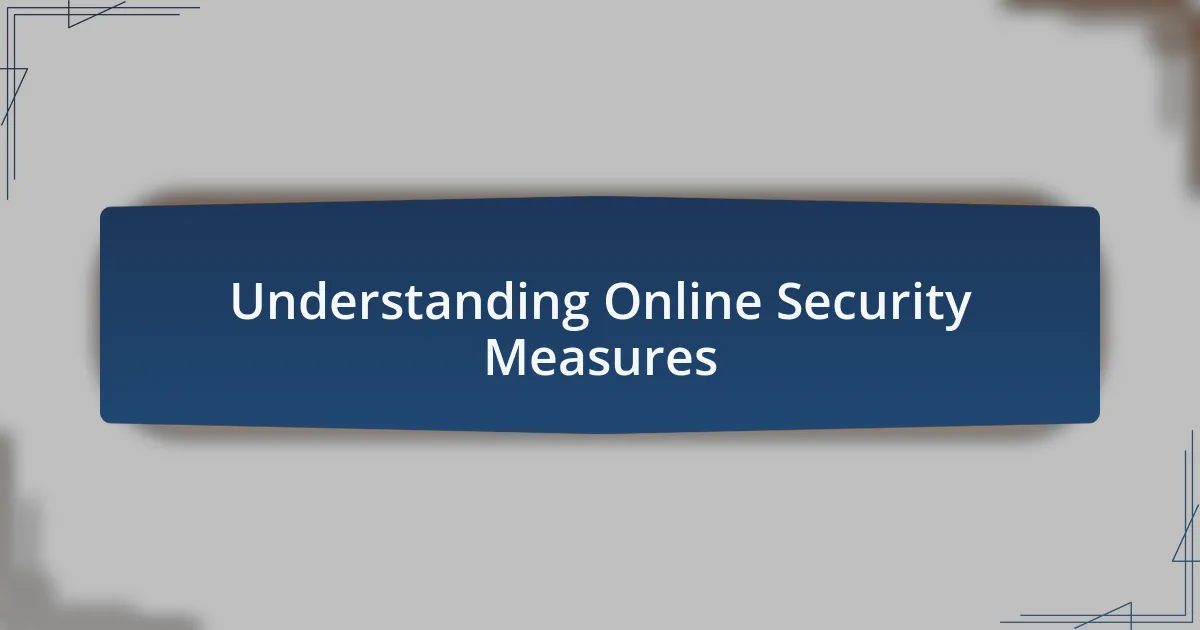
Understanding Online Security Measures
Online security measures are like an invisible shield that protects our personal information from prying eyes. I remember the first time I realized how vulnerable I was—after learning about a friend whose account was hacked. It struck me hard; a simple neglect of security could lead to devastating consequences.
Have you ever wondered why we often hear about data breaches? It’s because many people don’t prioritize understanding these measures. When I took the time to educate myself about the importance of strong passwords and two-factor authentication, I felt empowered. Suddenly, the daunting world of online security turned into an opportunity to reclaim control over my digital life.
Engaging with online security isn’t just about the technical aspects; it’s also about forming a protective mindset. I often reflect on the emotional weight of knowing that my sensitive information is secured. It’s a comforting feeling, akin to locking your front door at night. Isn’t it reassuring to think that investing a little time in understanding and applying these measures can safeguard your peace of mind?
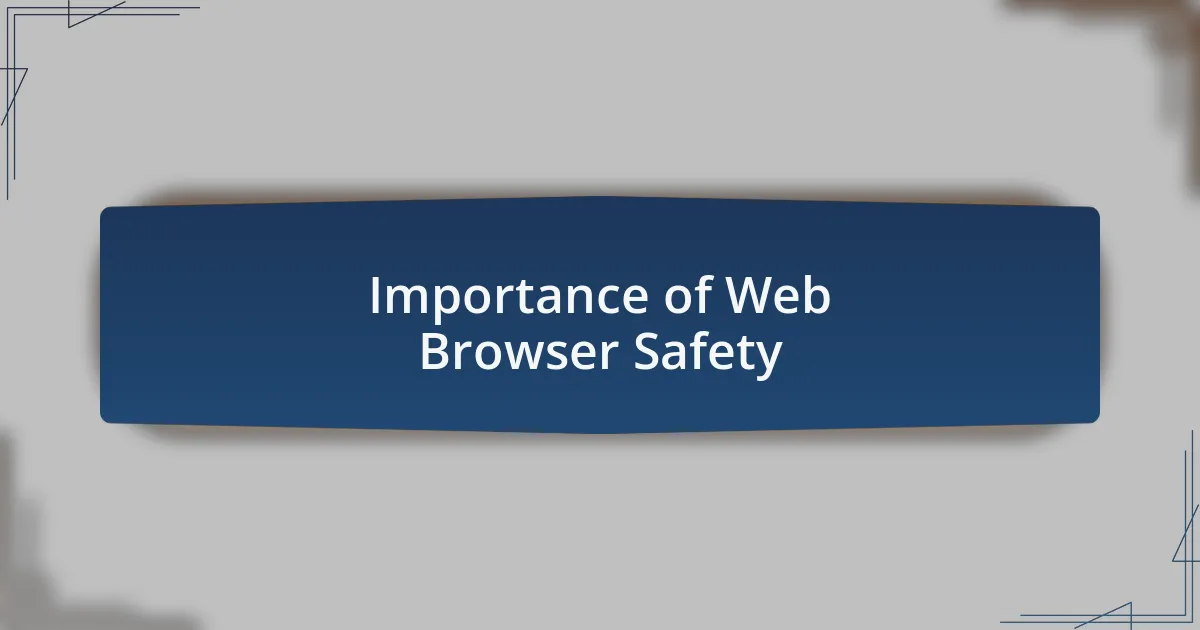
Importance of Web Browser Safety
Web browser safety is paramount because it serves as the gateway to our digital lives. I once clicked a seemingly harmless link, only to find my browsing experience compromised by malware. That unsettling moment made it clear to me how critical it is to ensure that my web browser is equipped with the latest security features. Can you imagine how easily one’s entire online identity can be jeopardized with just one careless click?
Moreover, staying informed about web browser safety isn’t just about avoiding threats; it’s about nurturing a proactive digital lifestyle. I’ve found that regularly updating my browser and enabling its built-in security settings keeps me one step ahead of potential risks. When I took these small yet impactful actions, I felt a significant shift in my confidence while navigating the web. Isn’t it amazing how a few adjustments can elevate our security without requiring extensive tech knowledge?
Ultimately, the importance of web browser safety resonates deeply with the broader issue of online security. Each time I log in to my bank or social media accounts, I’m reminded that safeguarding my browser also protects my sensitive data. It’s like wearing a seatbelt; the feeling of being secure can’t be overstated. Why not make it a habit to ensure that your web browser is an ally in your quest for online safety?
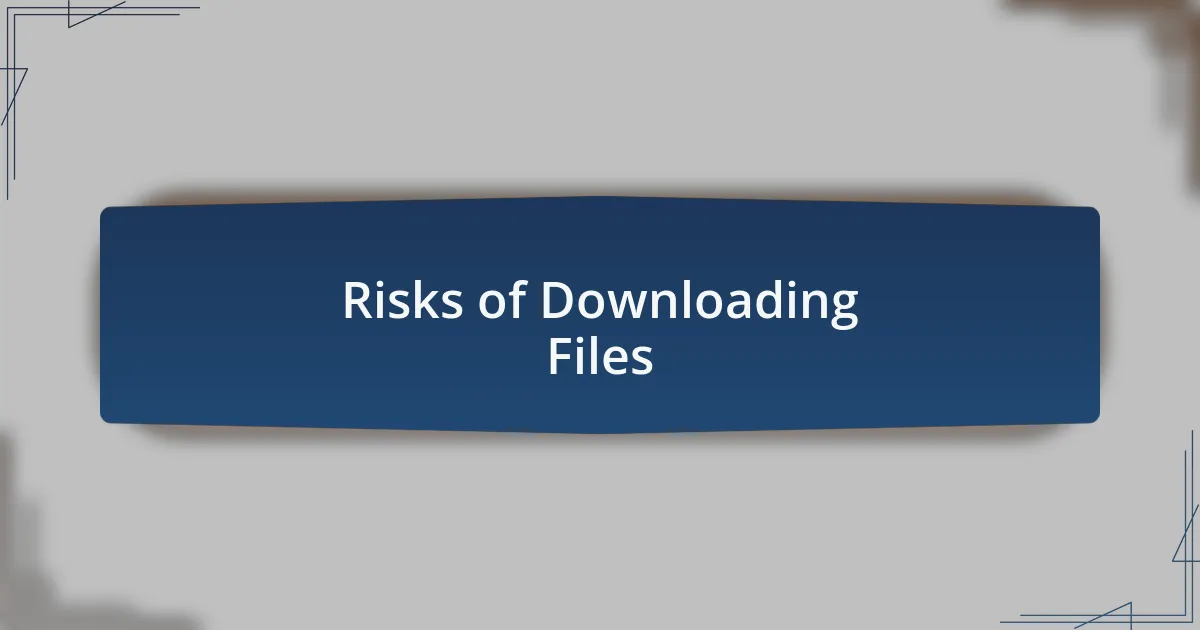
Risks of Downloading Files
There are significant risks associated with downloading files, and I’ve learned this through some rather eye-opening experiences. For instance, I once downloaded what I thought was a helpful software tool, only to discover that it was bundled with spyware. The invasive feeling of realizing my personal data could be at risk left me shaken. Have you ever felt that unsettling panic when you question what else might have slipped past your defenses?
Additionally, not all file sources are trustworthy. I often find myself vetting download links before clicking, a habit formed after a close call with a phishing attempt. It’s surreal to think that something as simple as a file could introduce identity theft or ransomware into my life. It really drives home the importance of being diligent; those seemingly helpful downloads can sometimes turn out to be disguised threats.
Another aspect to consider is the vulnerability of our devices. Each time I download an unverified file, I risk opening a door to potential malware infections that can compromise not only my device but also my home network. It’s a sobering thought: the convenience of a download can sometimes come with unforeseen consequences. Does it not make you ponder how essential it is to create robust security protocols before engaging in any downloading activity?
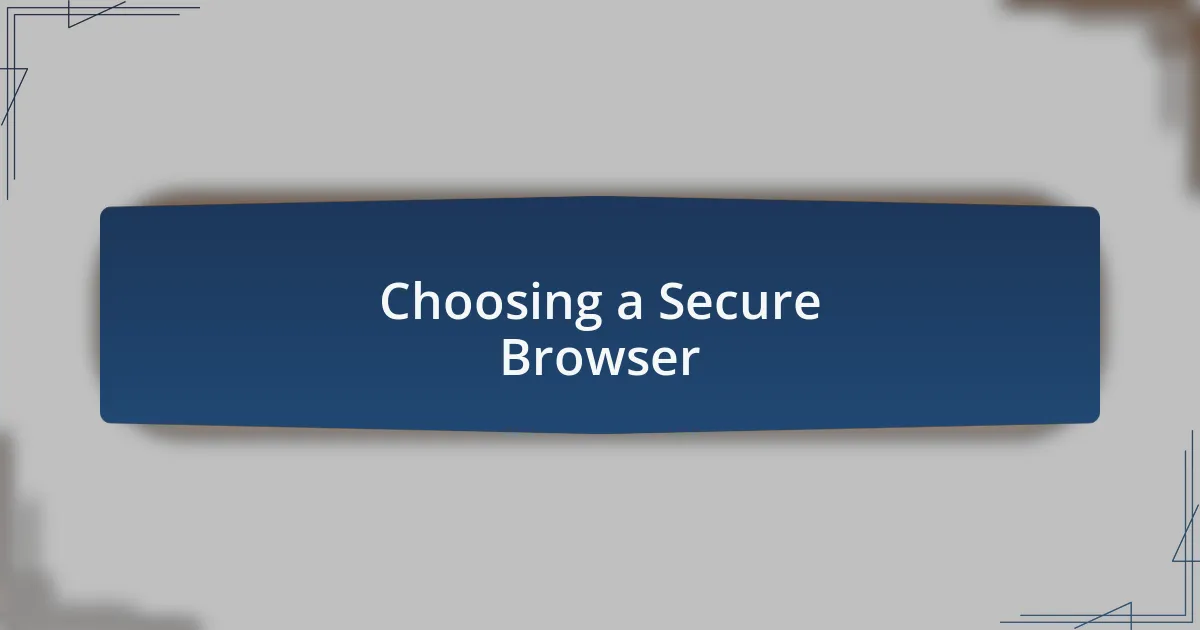
Choosing a Secure Browser
When it comes to selecting a secure browser, I prioritize those known for their strong privacy features. For instance, I remember switching to a more privacy-focused option after reading about how certain popular browsers track users’ data. That decision has given me peace of mind, knowing my web activity isn’t collected and sold. Have you ever stopped to consider what data you might unknowingly share while browsing?
Beyond just privacy, I also look for browsers that offer robust security features like built-in antivirus protection. I once encountered a website that tried to install malicious software, but my browser promptly blocked the attempt. It was a small victory, but it reinforced my belief that having the right browsing tools can act as a first line of defense. How often do we think about these protective layers while we navigate online?
Another crucial factor is the regular updates and support that a browser receives. There was a time I hesitated to update my browser out of convenience, only to find myself vulnerable to a known security flaw. That wake-up call made me realize that a secure browser isn’t just about initial features—it’s about ongoing vigilance and improvement. So, when was the last time you checked your browser for updates?
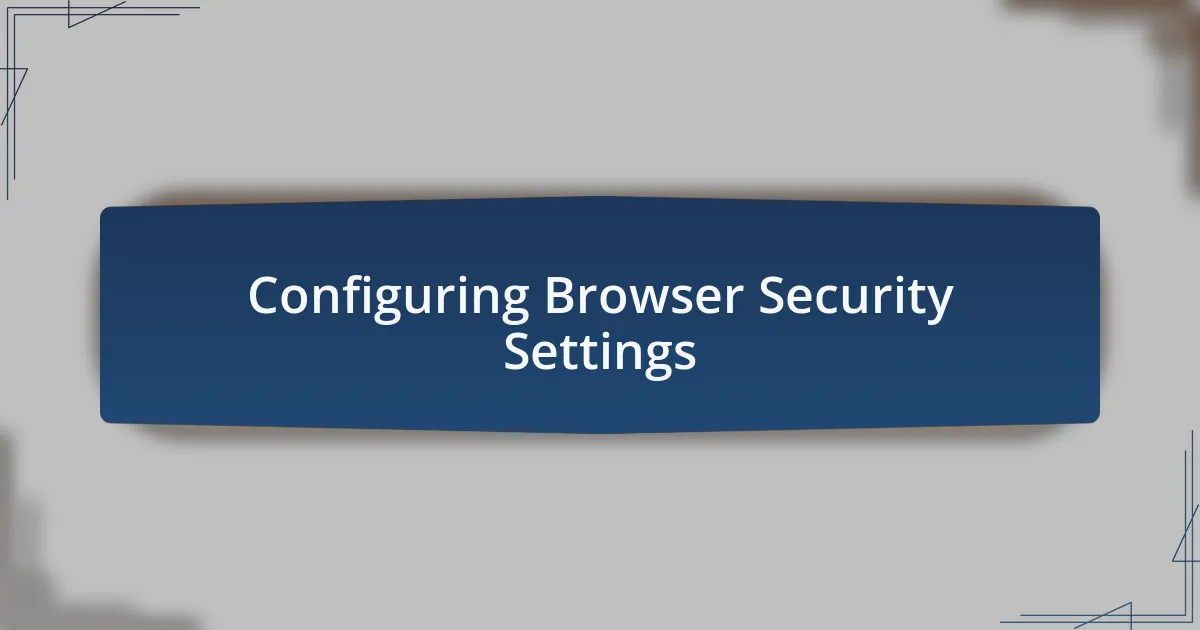
Configuring Browser Security Settings
Configuring browser security settings is where you really gain control over your online experience. I remember diving into the settings after realizing that default configurations are often not as tight as they should be. Adjusting privacy and security settings allowed me to block third-party cookies and prevent tracking — it was like flipping the switch on a hidden layer of protection. Have you ever taken the time to examine what data you’re inadvertently sharing in your browser?
One essential adjustment I made was increasing the level of security for websites I visit. By switching to a more rigorous security level, I found myself reassured that potentially harmful sites would be flagged before I even had the chance to interact with them. It’s a bit like having a trustworthy friend warning you about a sketchy place before you step inside. What peace of mind comes from knowing you’ve set those protections?
Lastly, I often delve into the browser’s extension settings, as they can pose risks if not properly managed. I distinctly recall uninstalling several extensions that I once thought were helpful but turned out to be gathering data without my knowledge. Now, I regularly audit these extensions to maintain a secure browsing environment. Have you taken a moment to assess the extensions in your browser lately? You might be surprised at what you find.
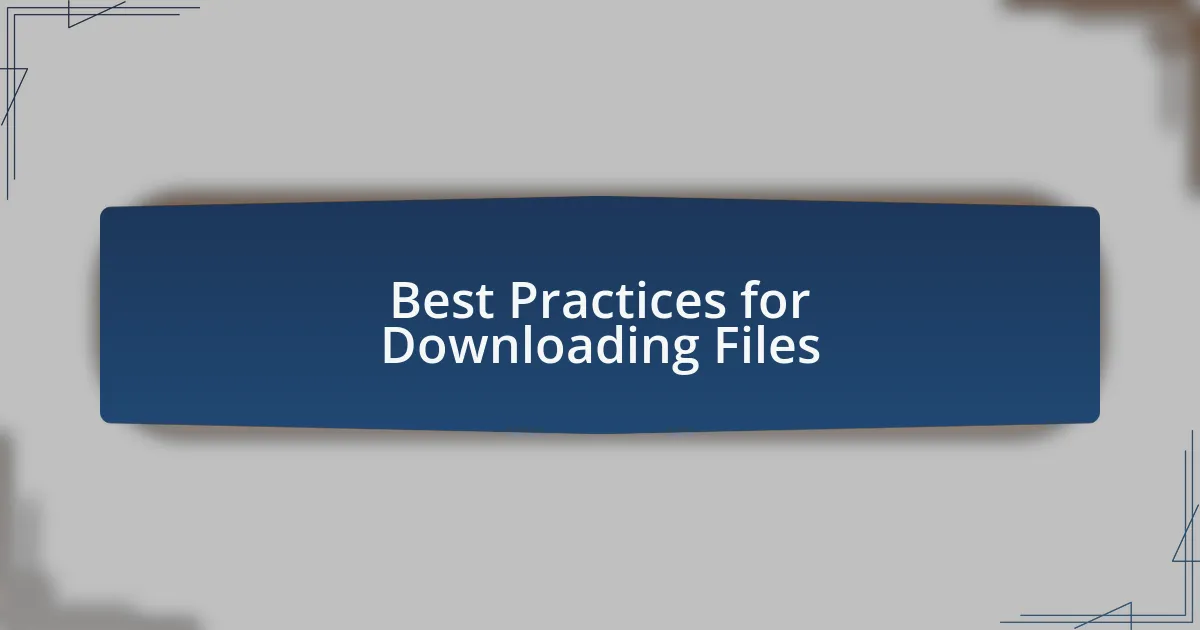
Best Practices for Downloading Files
When it comes to downloading files, I always make it a point to stick to trusted websites. I recall a time when I was tempted to download a tool from a lesser-known site, thinking it would save me a few bucks. The moment I hit download, my computer was bombarded with pop-ups and potential malware. It’s a stark reminder that a little caution can go a long way. Have you ever considered the risk of a single click?
Another practice I swear by is scanning files before opening them. I remember an instance when I received an email attachment from a colleague, and I felt an instinctive pause. Instead of rushing, I scanned the file with my antivirus software, and thankfully, it flagged a hidden threat. This simple step can save you from potential disaster. Why wouldn’t you want that extra layer of safety?
Lastly, keeping my software and antivirus up to date is non-negotiable. I clearly remember a day when an update introduced a feature that identified suspicious downloads in real-time. It’s fascinating how proactive measures can enhance security dramatically. So, when was the last time you checked for updates? Sometimes, the smallest adjustments can protect us from the biggest threats.